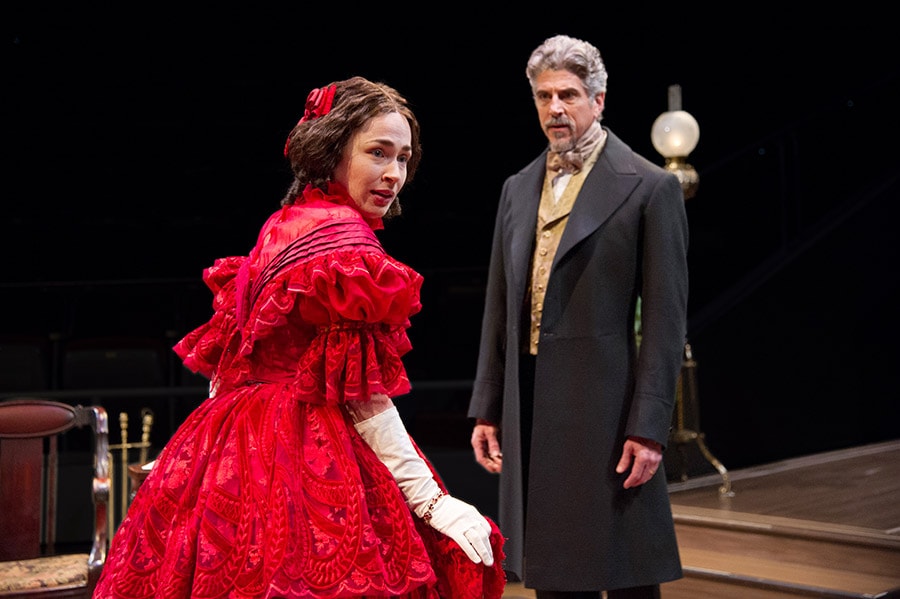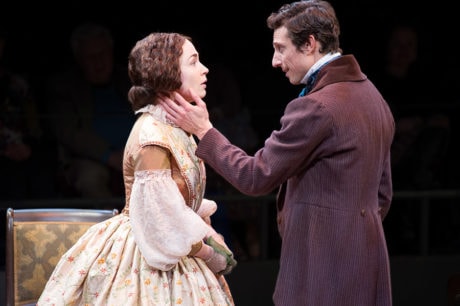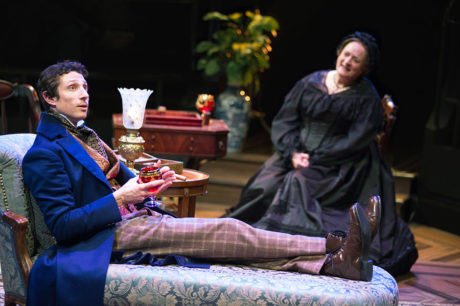Women are on the move today. A US Congress reflects the voices of women as never before. #MeToo movements everywhere are fighting the forces that would stifle those voices. So, on the surface, it seems that The Heiress, a classic melodrama set in the 1850s about a wealthy young woman who has not found her voice, would have little relevance today. However, those mid-19th-century forces, though appearing different, are really the same in 2019.

Directed by Seema Sueko, Deputy Artistic Director at Arena Stage, The Heiress spins a painful tale about a woman who, after reaching the depth of despair from emotional abuse, triumphantly fights back big-time, making an about-face toward personal freedom and independence. Its courageous message still resonates today.
The playwright team of Ruth and Augustus Goetz wrote The Heiress back in 1947 loosely based on a book by Henry James, “Washington Square,” the New York City setting for the play. The show had several great runs and revivals on Broadway and London stages, winning a Tony Award and big-screen success for Olivia de Havilland as the pathetic main character, Catherine Sloper. DC audiences are lucky to be able to see this timely classic at Arena Stage.
The neoclassical set design by Mikiko Suzuki MacAdams with its Empire style of simple elegance, strength, and prosperity sets the tone for the lifestyle of the rich in the drawing room of Dr. Austin Sloper, Catherine’s wealthy father. Catherine is set to inherit his fortune and already receives a hefty sum from the estate of her deceased mother, who died during her birth.
In Catherine Sloper, played by Laura C. Harris, we witness a painfully shy young woman who can barely look anyone in the eye. Dr. Sloper, played by James Whalen with great authority and stern decisiveness, never got over his wife’s death. He uses Catherine as the butt of his projection of bitterness and sadness. Catherine has lived a sheltered lifestyle devoid of parental love, under a father who belittles her with derision and veiled contempt.
Dr. Sloper beseeches his sister Lavinia to “Help [Catherine] to be clever. I would like her to be a clever woman”—as if it’s impossible that she is already clever! Harris is convincing as a vulnerable, pitiable woman completely lacking in self-confidence and a sense of her own identity.
Catherine falls for a conniving suitor who enters her life through family friends. Morris Townsend asks Catherine to marry him, having her inheritance in mind. They plan to elope after a super-brief courtship at her suggestion. But Catherine unwittingly lets Morris know that she probably would not receive her full inheritance because of her father’s disapproval of her marriage to the ne’er-do-well Townsend. Townsend jilts her and doesn’t show on the evening of their planned elopement.

The Heiress will cause anyone who has ever been stood up, abandoned or betrayed in a relationship to wince. There was a collectively held breath that never seemed to exhale until the surprising end of the play. And the audience’s collective blood pressure rises during the tense, late-night hour when Catherine anxiously waits for Morris to sweep her away to marry at a nearby parsonage. She is emotionally shattered when Morris jilts her. Laura C. Harris’ meltdown is painful to watch and touches a nerve that is familiar to anyone who has been deceived in love.
Emotional pain, however, eventually leads Catherine to define her own identity. Courageously responding to Morris’ betrayal and a life lived to please a father who never loved her, she finally finds the guts to believe in herself and to live life on her own terms. She chooses to find her own voice.
Jonathan David Martin as Morris Townsend has the oily charm of an opportunistic suitor. You want to believe in him for Catherine’s sake – but you just can’t!
The cast includes the fantastic Nancy Robinette as Lavinia Penniman, Catherine’s lovable, bumbling, widowed aunt, who is so in love with the notion of falling in love again that she turns a blind eye on Townsend’s insincerity and encourages Catherine to fall for his wiles.
Lise Bruneau (Mrs. Montgomery), Lorene Chesley (Marian Almond), Janet Hayatshahi (Elizabeth Almond), Kimberly Schraf (Maria) and Nathan Whitmer (Arthur Townsend/the de Rhams’ Coachman) are supporting characters who add comic relief through familial connections and friends to the strained relationship between Catherine Sloper and her father.

Costume Design by Ivania Stack is a rich period wardrobe of beautiful, heavy satin and embroidered fabrics, lavish, wide-hooped skirts and elegantly detailed morning coats and top hats worn by the rich and famous women and men of the day.
Lighting Designer Sherrice Mojgani, Sound Designer Emma M. Wilk (who also composed original music for the production), Wig Designer Anne Nesmith, Voice and Text Coach Jan Gist, and Stage Manager Susan R. White complete the all-female, multiracial team of award-winning artists.
Arena Stage has put its money where its mouth is when it comes to promoting diversity, equity, and inclusion, particularly women’s voices. Under Artistic Director Molly Smith’s leadership, 70% of its plays have been directed by women or people of color and 50% of its productions have been written by women or playwrights of color.
The Heiress is a long play with the first and second acts evenly developed. The first act unfolds very slowly, however, and Catherine’s whimpering personality can be insufferable. But you can’t help unconsciously rooting for the underdog to stand up for herself and defy the jerks in her life. So you are deep in the story for the long haul.
The second act satisfies the audience’s need to exhale as Catherine slowly but surely begins to wake up to the reality of her own self-worth. It was well worth the wait, and the cozy Fichandler’s theater-in-the-round makes watching The Heiress feel like you are curled up with a good book that you don’t want to end.
The Heiress is slow-burn melodrama with a message — at its finest. And the Goetzes’ ending for The Heiress feels perfectly right for our times, as Catherine defiantly declares, “I can do anything now.”
Running Time: Three hours, including a 15-minute intermission.
The Heiress plays through March 10, 2019, at Arena Stage – 1101 Sixth Street, SW, Washington, DC. For tickets, call (202) 488-3300 or purchase them online.





Your description of a “slow burn melodrama” captures the essence of this too lengthy – three hour period piece that stretched the link to the #MeToo movement a bit too far. But revenge is a dish best served cold, and The Heiress was a cold B!
I think you misunderstand the play. Dr. Sloper doesn’t hate Morris because he sees him as an opportunist.
He hates him because he makes Cathie happy. He blames her for his wife’s death, and has raised her not only to be unloved but to be despised. Dr. Sloper flat out tells his daughter that, once he’s gone, she can use her money to find another man besides Morris. He is that hateful as to state that the only reason anyone would be with her is for her money. Lavinia may be in love with the notion of being in love, but she’s also correct that Morris does love her, or at least likes her, and wouldn’t mistreat her (as her father does, and as men were wont to do at the time the story is set). She’s a pragmatist, and she knows Morris better than anyone, having spent more time with him than anyone in the story, including Catherine. It can be argued that his “jilting her” is an act of kindness, in preventing her from losing the major part of her inheritance, and would have been considered the right and proper thing to do at the time of the story, even for a gigolo/opportunist. Catherine “doesn’t find her own voice”. She BECOMES her father–an embittered miserable woman whose only company will be the staff she pays to attend her.
I found Nancy Robinette’s performance brilliant. Laura C. Harris’ performance portrayed Catherine as more autistic than shy. At least on the night I saw it, the cast other than Ms. Robinette was adequate, but stiff, saying their lines rather than inhabiting their roles.